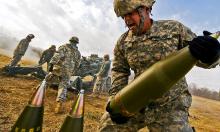Peace is near? Russia's Lavrov goes for OSCE summit
Europe has recognised the need for negotiations with Russia to discuss the security system on the continent. Russian Foreign Minister Sergei Lavrov is going to Macedonia for meetings with colleagues within the OSCE.
Russia launched the special military operation in Ukraine after the West refused to provide written guarantees for the security of the Russian Federation.
On Wednesday, November 29, it was announced that Russian Foreign Minister Sergei Lavrov will attend the meeting of OSCE foreign ministers (Organization for Security and Cooperation) on November 30 — December 1. This will be Russia's first contact with the OSCE since the start of the special military operation.
The OSCE previously took a pro-Ukrainian position in mediation operations in Donbass. Before the start of the operation, Russia decided to withdraw staff from the OSCE mission in Donbass and opposed extending the mission mandate on the whole.
A year ago, French President Emmanuel Macron said in an interview with TF1 that the future European security should include guarantees for Russia. It appears that the process in this direction is about to start now.
To ensure Lavrov's arrival in Skopje, Bulgaria and North Macedonia promised to open their airspace.
Why does the West want to start talking to Russia?
The West has not achieved its goals in the proxy war with the Russian Federation in Ukraine. The Global South does not support the West, and Westerners fear that all the weapons that Russia has been producing lately in increasingly large quantities will eventually be aimed at them.
Indeed, conflicts may spark on the territory of the former Yugoslavia, Transnistria, Georgia, Belarus (aggression of Poland).
Four countries oppose Russia's participation
As soon as Lavrov's participation was confirmed, foreign ministers of Ukraine, Latvia, Lithuania and Estonia canceled their visits to Skopje.
According to them, the participation of the Russian delegation in the summit may "legitimise Russia the aggressor,” as well as "downplay the brutal crimes that Russia is committing.” The Ukrainian Foreign Ministry accused Russia of creating "an existential crisis within the OSCE.”
Russian Foreign Ministry spokeswoman Maria Zakharova said at a briefing on November 29 that Moscow was observing the efforts that a number of Western countries were making to stop Russia from participating in the OSCE meeting. According to her, Lavrov will hold a number of bilateral and multilateral meetings. There is a precedent: Hungarian Prime Minister Viktor Orban met Russian President Vladimir Putin in Beijing at the BRICS summit in October. Orban told Putin during the meeting that "Hungary never wanted confrontation with Russia.”
Indicatively, NATO chief Jens Stoltenberg refused to give advice to OSCE summit organisers regarding Sergei Lavrov's participation.
According to Reuters, US Presidential National Security Adviser Antony Blinken will also take part in the meeting, although he does not plan to hold a meeting with Sergei Lavrov.
What is Lavrov going to say?
It goes without saying that the Ukrainian crisis is going to dominate the summit agenda. Lavrov will be ready to fully explain Russia's position and how Moscow sees the end of the conflict.
Judging by his latest statements, Russia is not interested in a truce just for the sake of a truce, since it will give the Kyiv regime an opportunity to try to save itself and rearm. The West is a non-negotiable party. This means that the West must take real steps, but not declarative statements for the process of negotiations to start.
It appears that it goes about a decision to cease arms supplies to Ukraine.
The OSCE is a regional security-oriented intergovernmental organisation composed of member states from Europe, North America and Asia. The OSCE deals with such issues as arms control, human rights, freedom of the press and free and fair elections. The OSCE was founded in 1975: its predecessors came together during the Cold War to form a forum for discussions between the Western and Eastern blocs.
Subscribe to Pravda.Ru Telegram channel, Facebook, RSS!




